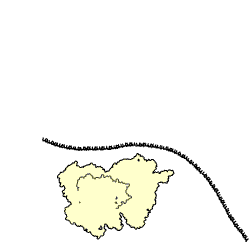Molecular nanotechnology
Molecular nanotechnology (MNT) is a branch of nanotechnology that involves the manipulation of individual molecules to create complex structures and devices at the molecular scale. This field combines principles from chemistry, physics, biology, and engineering to design and build materials and machines with atomic precision.
Overview[edit | edit source]
Molecular nanotechnology aims to construct materials and devices with atomic precision by controlling the arrangement of atoms and molecules. This precise control allows for the creation of new materials with unique properties and the development of nanoscale machines, often referred to as nanorobots or nanobots.
History[edit | edit source]
The concept of molecular nanotechnology was first proposed by Richard Feynman in his famous 1959 lecture, "There's Plenty of Room at the Bottom." Feynman envisioned the possibility of manipulating individual atoms and molecules to create new materials and devices. The term "molecular nanotechnology" was later popularized by K. Eric Drexler in his 1986 book, "Engines of Creation: The Coming Era of Nanotechnology."
Principles[edit | edit source]
Molecular nanotechnology is based on several key principles:
- **Atomic Precision**: The ability to position atoms and molecules with high precision to create desired structures.
- **Self-Assembly**: The process by which molecules spontaneously organize into stable, well-defined structures.
- **Mechanosynthesis**: The use of mechanical processes to guide chemical reactions and build molecular structures.
Applications[edit | edit source]
Molecular nanotechnology has the potential to revolutionize various fields, including:
- **Medicine**: Development of targeted drug delivery systems, nanoscale diagnostic tools, and advanced medical implants.
- **Materials Science**: Creation of new materials with enhanced properties, such as increased strength, lighter weight, and improved conductivity.
- **Electronics**: Development of smaller, faster, and more efficient electronic components and devices.
Challenges[edit | edit source]
Despite its potential, molecular nanotechnology faces several challenges:
- **Technical Limitations**: Current technology is not yet capable of achieving the level of precision required for many MNT applications.
- **Ethical and Safety Concerns**: The potential risks associated with the uncontrolled use of nanotechnology, such as environmental impact and ethical considerations, need to be addressed.
Future Prospects[edit | edit source]
Research in molecular nanotechnology continues to advance, with ongoing efforts to overcome technical challenges and explore new applications. The future of MNT holds promise for significant breakthroughs in various fields, leading to transformative changes in technology and society.
Related Pages[edit | edit source]
Categories[edit | edit source]
Lua error in package.lua at line 80: module 'strict' not found.
Search WikiMD
Ad.Tired of being Overweight? Try W8MD's physician weight loss program.
Semaglutide (Ozempic / Wegovy and Tirzepatide (Mounjaro / Zepbound) available.
Advertise on WikiMD
|
WikiMD's Wellness Encyclopedia |
| Let Food Be Thy Medicine Medicine Thy Food - Hippocrates |
Translate this page: - East Asian
中文,
日本,
한국어,
South Asian
हिन्दी,
தமிழ்,
తెలుగు,
Urdu,
ಕನ್ನಡ,
Southeast Asian
Indonesian,
Vietnamese,
Thai,
မြန်မာဘာသာ,
বাংলা
European
español,
Deutsch,
français,
Greek,
português do Brasil,
polski,
română,
русский,
Nederlands,
norsk,
svenska,
suomi,
Italian
Middle Eastern & African
عربى,
Turkish,
Persian,
Hebrew,
Afrikaans,
isiZulu,
Kiswahili,
Other
Bulgarian,
Hungarian,
Czech,
Swedish,
മലയാളം,
मराठी,
ਪੰਜਾਬੀ,
ગુજરાતી,
Portuguese,
Ukrainian
Medical Disclaimer: WikiMD is not a substitute for professional medical advice. The information on WikiMD is provided as an information resource only, may be incorrect, outdated or misleading, and is not to be used or relied on for any diagnostic or treatment purposes. Please consult your health care provider before making any healthcare decisions or for guidance about a specific medical condition. WikiMD expressly disclaims responsibility, and shall have no liability, for any damages, loss, injury, or liability whatsoever suffered as a result of your reliance on the information contained in this site. By visiting this site you agree to the foregoing terms and conditions, which may from time to time be changed or supplemented by WikiMD. If you do not agree to the foregoing terms and conditions, you should not enter or use this site. See full disclaimer.
Credits:Most images are courtesy of Wikimedia commons, and templates, categories Wikipedia, licensed under CC BY SA or similar.
Contributors: Prab R. Tumpati, MD





